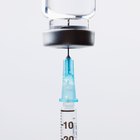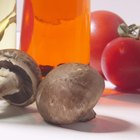
AbelBrata/iStock/Getty Images
Monosodium glutamate, or MSG, is the salt form of the amino acid glutamate. MSG is added to many foods to enhance flavor, and it also occurs naturally in tomatoes, cheeses and in the ingredients of protein isolate, hydrolyzed vegetable protein, autolyzed and hydrolyzed yeast, yeast extract and soy extract. While the U.S. Food and Drug Administration considers added MSG "generally recognized as safe," many people claim MSG causes migraine headaches and respiratory distress. However, there is no consensus among researchers on whether these symptoms are a direct result of eating MSG.
Migraine Headaches -- No Consistent Evidence
A review published in 2006 in the "Journal of the American Academy of Nurse Practitioners" -- based on 40 years of scientific literature on the subject of MSG and migraines -- found no consistent evidence to support that MSG is a direct trigger for these headaches.
Higher Blood Pressure
Sodium is widely known among researchers and health care providers to increase blood pressure directly. Researchers of one study published in 2011 in the "Journal of Hypertension" found MSG -- a dietary source of sodium -- to be an independent cause of increased blood pressure in Chinese people, particularly women and those who were already taking medications for high blood pressure. According to the American Heart Association, if your blood pressure becomes very high, it may cause a headache. Although it is plausible that MSG can increase blood pressure and contribute to a headache, more research to prove this is warranted.
Respiratory Distress and Asthma Exacerbation
The researchers of the 2006 study published in "Journal of the American Academy of Nurse Practitioners" also reviewed MSG as a possible trigger for asthma but found no consistent data. Later, in 2009, a review was published in "Clinical and Experimental Allergy" on the relationship between MSG and a number of symptoms, including respiratory distress, asthma exacerbation and rhinitis -- inflammation of the nostrils. The researchers concluded there was no clear, consistent evidence that MSG causes these respiratory symptoms.
Effects of Too Much MSG
Eating too much MSG may cause mild short-term problems. In the 1990s, the FDA asked an independent scientific group, the Federation of American Societies for Experimental Biology, to test the safety of MSG after some people reported adverse affects. The FASEB found that after some individuals consumed 3 or more grams of MSG without any food, they experienced symptoms that included drowsiness, flushing, numbness, tingling, palpitations and headache. The FDA describes the symptoms as generally mild, short-term and transient, and it notes that food containing added MSG typically contains less than 1/2 gram per serving.
What You Can Do
For MSG sensitivity, the University of Michigan Health System recommends getting additional vitamin B-6 daily to process MSG into harmless byproducts and avoiding Accent and Aji-No-Moto seasonings in foods. If you are concerned that you may be sensitive to MSG, speak with your doctor before adding supplemental vitamin B-6 to your diet. You may also want to ask your doctor what you can do other than simply reading labels and asking restaurant staff if the food contains MSG in order to avoid it.
Related Articles

What Are the Benefits of Extrapone ...

Skin Benefits of Eating Coconut Oil

How to Reduce Acne Inflammation

Dimethicone Hazards

What Foods Provide Calcium D-Glucarate?

Zinc Treatment for Rosacea

Arginine for Hair Growth

Nutritional Information for Johnny's ...

Is Allantoin a Relative of the Lanolin ...

Seaweed and Acne

Nutritional Facts of Fava Beans

Chasteberry for Acne

Foods to Avoid to Prevent Gout

Mineral Oil Vs. Olive Oil

How to Find a Salt Substitute Without ...

What Is Aloe Good For?

Recommended Daily Dosage of Saw ...

Can Borage Oil Help Acne?

The Disadvantages of Saccharin

Foods Containing DMAE
References
- U.S. Food and Drug Administration: Questions and Answers on Monosodium Glutamate (MSG)
- Journal of Hypertension: Monosodium Glutamate Is Related to a Higher Increase in Blood Pressure Over 5 Years: Findings From the Jiangsu Nutrition Study of Chinese Adults
- Clinical and Experimental Allergy: Monosodium Glutamate 'Allergy': Menace or Myth?
- University of Michigan Health System: MSG Sensitivity
- Journal of the American Academy of Nurse Practitioners: Reconsidering the Effects of Monosodium Glutamate: A Literature Review
- American Heart Association: What Are the Symptoms of High Blood Pressure?
Writer Bio
Jamie Yacoub is a clinical outpatient Registered Dietitian, expert in nutrition and author of her cookbook "Modern Guide to Food and Eating: Low Glycemic Recipes". She obtained a Bachelor of Science in clinical nutrition from UC Davis and an MPH in nutrition from Loma Linda University. Yacoub then completed her dietetic internship as an intern for a Certified Specialist in sports nutrition and at a top-100 hospital.
Photo Credits
AbelBrata/iStock/Getty Images